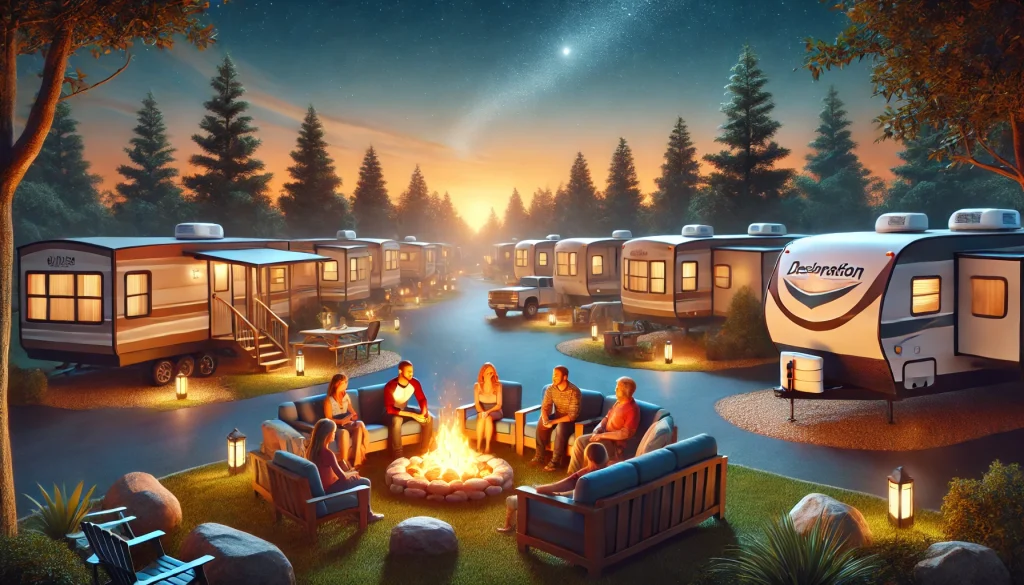Converting an RV park to a cooperative—or a similar structure like a member-owned nonprofit corporation—remains a relatively unknown, underutilized, and underappreciated exit strategy for RV park owners. Yet, it could be one of the most compelling options available to you if your plan was to sell. Instead of navigating the complexities of a traditional sale, park owners can transition their property into a resident-owned community, unlocking unique financial, operational, and legacy benefits. This approach not only offers a fair market (or even above market) return for the owner but also empowers residents to become stewards of the park. For those seeking an exit strategy that prioritizes community, continuity, and profit, a cooperative conversion is well worth exploring.
From Ownership to Partnership: Why Consider a Cooperative?
Converting your RV park to a cooperative is more than a business decision—it’s a way to build a stronger, more engaged community while securing a lasting legacy. A cooperative structure allows residents to acquire ownership shares, turning your park into a shared venture.
For RV park owners, this approach can create long-term stability and a sustainable financial model. It also empowers residents, giving them a sense of belonging and shared responsibility. If you’ve ever dreamed of creating a thriving, tight-knit community, transitioning to a cooperative could be your next big move.
The Cooperative Model: What Is It and Why Does It Work?
A cooperative is a member-owned business entity where decisions are made democratically. Each member holds a share and has an equal say in major decisions. This model is particularly well-suited for RV parks, where fostering a sense of community is key. In a cooperative, rules and regulations are set by the members themselves, ensuring that the needs of the majority are met.
The Process: How to Convert Your RV Park to a Cooperative
Converting your RV park to a cooperative requires careful planning and coordination. Start by gauging interest among your residents. Are they excited about the idea of ownership? If so, your next step is to create a plan that outlines the structure and process.
You’ll need to convert the legal ownership of the RV park to reflect the new structure. You’ll need to draft bylaws, which are the governing rules of your cooperative. These should cover member responsibilities, voting rights, and financial contributions. Enlisting the help of a legal professional with cooperative experience is crucial at this stage.
Who to Involve: Building the Right Team
Transitioning to a cooperative isn’t a solo endeavor. You’ll need a team of professionals to guide you through the process. A legal expert will help decide on ownership structure, draft the bylaws and ensure compliance with all rules and regulations.
A financial advisor or accountant can assist with structuring member financing options. This is critical for helping residents afford their ownership shares. Finally, consider hiring a governance consultant to train the new cooperative board and set up effective management systems.
A consultant can also be a useful team member to help lead the process, connect the dots and provide guidance and advice along the way.
Bylaws and Governance: The Backbone of a Successful Cooperative
Bylaws are the foundation of your cooperative. They outline everything from how decisions are made to how disputes are resolved. Well-crafted bylaws ensure that the cooperative operates smoothly and transparently.
The cooperative board is equally important. Members may be unfamiliar with governance practices, so providing resources and guidance will empower them to manage the park effectively. This training helps foster trust and ensures the cooperative’s long-term success.
Financing Options: Making Ownership Affordable for Members
Not every resident will have the cash on hand to purchase an ownership share. Offering flexible financing options is a great way to lower barriers to entry. You can provide in-house financing or partner with local credit unions experienced in cooperative lending.
Explaining these options clearly to residents can increase buy-in. Additionally, offering deferred payment plans or subsidies for long-time residents can help make ownership more inclusive and equitable.
Rules and Regulations: Setting the Stage for Harmony
Clear rules and regulations are essential for any cooperative. These rules ensure that all members understand their rights and responsibilities, helping to prevent conflicts.
For RV parks, these rules might include guidelines for site maintenance, use of shared amenities, and noise restrictions. Because these rules are created by and for the members, they are more likely to reflect the community’s values and priorities.
Building Community: The Heart of the Cooperative Model
One of the greatest benefits of converting your RV park to a cooperative is the opportunity to build a stronger sense of community. When residents have a stake in ownership, they’re more likely to participate in park activities, upkeep, and decision-making.
This shared responsibility fosters connections and creates a culture of collaboration. Over time, your RV park will evolve from a simple campground to a vibrant, engaged community where everyone feels at home.
Leaving a Legacy: What It Means to Create a Cooperative
Converting your RV park to a cooperative isn’t just about finances or operations; it’s about leaving a legacy. This structure ensures that your park will thrive long after you step away, thanks to the empowered community you’ve built.
By turning your park into a cooperative, you create a model that prioritizes people and sustainability. It’s a chance to transform a business into a lasting institution that residents will cherish for generations.
Final Thoughts: The Path to a Cooperative Future
Converting your RV park to a cooperative may seem like a big step, but with careful planning and the right team, it’s an achievable and rewarding goal. From drafting bylaws to setting up financing and governance, each step brings you closer to creating a community-centered legacy.
For park owners looking to align their business with their values, a cooperative offers a unique opportunity to do just that. It’s a model that benefits everyone involved—owners, residents, and the community at large.

